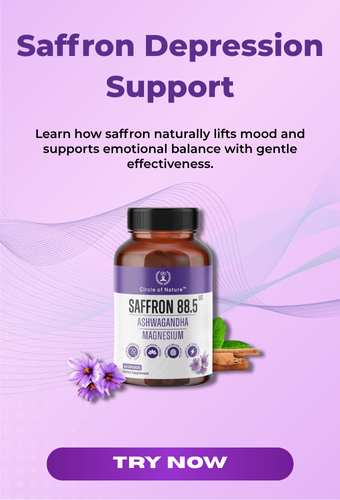Finding the best saffron supplement for depression can transform your mental health. Depression affects millions of people worldwide, leaving them searching for effective solutions with fewer side effects than traditional medications.
Saffron, the golden-red spice from delicate crocus flowers, offers remarkable hope. Modern science validates saffron’s ability to improve mood, reduce depressive symptoms, reduce anxiety symptoms, better emotional control in people with ADHD and support emotional naturally.
This guide you will discover how saffron works, what dosage proves most effective, and which quality markers ensure you get real results for depression.
Understanding Depression and Natural Treatment Options
Depression goes far beyond temporary sadness. This serious mental health condition affects how you feel, think, and handle daily activities. Symptoms include persistent sadness, loss of interest in activities, changes in appetite, sleep disturbances, fatigue, and difficulty concentrating.
Research published in PMC notes that safety concerns and side effects of many antidepressant medications have led to increased interest in herbal alternatives.
Common side effects of prescription antidepressants include:
- Weight gain or loss
- Sexual dysfunction
- Sleep problems
- Nausea and digestive issues
- Emotional numbness
- Withdrawal symptoms when stopping
These challenges explain why many people seek natural options. They want effective depression relief without compromising other aspects of their health and well-being
How Saffron Works as a Natural Antidepressant
The best saffron supplement for depression works through multiple mechanisms in your brain. Understanding these actions helps explain why research shows such promising results.
Saffron’s Active Mood-Boosting Compounds
Three primary compounds give saffron its antidepressant properties:
Crocin – Research published in PMC shows that crocin acts as a monoamine oxidase inhibitor and also inhibits the reuptake of monoamines, helping regulate mood naturally.
Safranal – safranal works primarily on serotonin reuptake. Studies published in PMC indicate that saffron extract might inhibit serotonin reuptake in synapses, keeping serotonin active in your brain longer.
Picrocrocin – This compound contributes to saffron’s unique taste while supporting overall brain health and cognitive function during depressive episodes.
Multiple Pathways for Mood Support
Unlike single-target pharmaceutical antidepressants, saffron affects several brain systems simultaneously. This multi-target approach may explain why the best saffron supplement for depression produces such comprehensive results.
Saffron influences:
- Serotonin levels and activity
- Dopamine regulation
- Norepinephrine balance
- Brain-derived neurotrophic factor (BDNF)
- Anti-inflammatory pathways in the brain
- Antioxidant protection for brain cells
The Science: Clinical Evidence for Saffron and Depression
Multiple clinical trials demonstrate that the best saffron supplement for depression delivers real, measurable results. Let’s examine the compelling research evidence.
Meta-Analysis Results
A comprehensive meta-analysis published in PubMed analyzed multiple clinical trials. Results showed that saffron had a large positive effect when compared with placebo for depressive symptoms (g = 0.99, P < 0.001).
This effect size means saffron produced substantial improvements in depression scores. Moreover, the analysis found these benefits occurred across different study populations and designs, strengthening confidence in the findings.
Comparison with Standard Antidepressants
Perhaps most remarkably, research shows saffron performs comparably to prescription medications. Studies published in PubMed found that saffron’s effectiveness in treating mild to moderate depression matches that of standard treatments while offering a better safety profile.
Multiple trials directly compared saffron with commonly prescribed antidepressants:
Versus Fluoxetine (Prozac) – Research published in PMC showed that administering saffron extract at 30 mg/day for 6 weeks proved as effective as fluoxetine in treating mild to moderate depression.
Versus Imipramine – Studies found saffron supplementation produced similar depression score improvements compared with this tricyclic antidepressant.
As Adjunct Therapy – Research published in PubMed revealed that saffron had a large positive effect when used alongside antidepressants for depressive symptoms (g = 1.23, P = 0.028).
Recent Large-Scale Studies
A 2025 study published in PubMed represents the largest trial conducted on saffron to date. This research provides evidence supporting the beneficial effects of 3 months of saffron supplementation on depressive symptoms in adults.
Additionally, recent 2025 research published in PubMed found that 8-week saffron add-on therapy induced global improvement in depressive symptoms and significant reduction in anhedonia (inability to feel pleasure).
Read More about The Science Behind Saffron Supplements: Your Natural Path to Better Focus and Mood!
What Makes the Best Saffron Supplement for Depression?
Several key factors determine whether a saffron product delivers the depression relief shown in clinical studies.
Optimal Dosage for Depression
Research consistently identifies specific dosage ranges that produce antidepressant effects. The best saffron supplement for depression provides these clinically-studied amounts.
Higher Potency Options – Formulas providing 88.5mg daily may offer enhanced benefits for some individuals, though research at this level remains more limited.
Best Quality Factor
Raw saffron varies dramatically in active compound content. Therefore, the best saffron supplement for depression uses standardized extracts that guarantee consistent potency.
Crocin Standardization – Look for extracts standardized to at least 2-3% crocin. This ensures adequate amounts of this key antidepressant compound.
Safranal Standardization – Quality supplements specify 2-2.5% safranal content. This compound plays a crucial role in serotonin regulation.
Dual Standardization – Premium products provide both crocin and safranal percentages, ensuring comprehensive active compound delivery.
- Third-party testing for purity
- Verification of authentic Crocus sativus
- GMP-certified manufacturing
- Saffron supplements come in several forms, each with distinct advantages:
Extract Capsules – Most clinical studies use concentrated extracts in capsule form. This method provides precise dosing and convenient daily use.
Powder vs. Extract – Concentrated extracts provide more consistent results than simple saffron powder. Extraction processes concentrate active compounds while removing inactive material.
Read More About Why Extracts are better than raw powder?
Circle of Nature's Premium Saffron Extract 88.5mg for Depression Support
At Circle of Nature, we’ve formulated the best saffron supplement for depression based on clinical research and quality standards that ensure real results.
Our Evidence-Based Formula
88.5mg Standardized Saffron Extract – We provide a potent dose that exceeds typical clinical study amounts, offering enhanced therapeutic potential for depression relief.
3% Crocin / 2.5% Safranal – Our dual standardization guarantees consistent levels of both key antidepressant compounds in every capsule.
Enhanced Absorption – Each serving includes complementary ingredients that support optimal saffron absorption and utilization.
Comprehensive Mood Support System
Our formula addresses multiple factors affecting mental health:
Ashwagandha Root Extract – This adaptogen helps manage stress hormones that often worsen depression. Studies show ashwagandha reduces cortisol levels by 27.9%, supporting better emotional balance.
Magnesium Glycinate – This highly-absorbable magnesium form supports nervous system function and promotes better sleep quality. Poor sleep frequently accompanies and worsens depression.
Read More About Magnesium Glycinate: A Natural Approach to Restful Sleep.
Quality Assurance Standards
- Made in USA – Manufactured in GMP-certified facilities following strict quality protocols.
- Third-Party Tested – Independent laboratories verify purity, potency, and absence of contaminants.
- Natural Ingredients – No artificial additives, fillers, or unnecessary ingredients.
- Vegetarian Capsules – Suitable for various dietary preferences and restrictions.
How to Use Saffron for Depression Relief
Achieving the best results from the best saffron supplement for depression requires proper usage and realistic expectations.
Dosing Guidelines
Starting Dose – Begin with one capsule daily, preferably with a meal to enhance absorption and reduce potential stomach upset.
Timing – Take saffron at the same time each day to maintain consistent levels. Morning dosing works well for most people.
Consistency Matters – Daily supplementation produces better results than sporadic use. Your brain needs sustained saffron exposure to benefit fully.
Timeline for Results
Understanding what to expect helps you stay committed during the initial weeks:
Weeks 1-2 – Subtle improvements may emerge, including slightly better sleep or reduced anxiety. Some people notice no changes yet, which is normal.
Weeks 3-4 – More noticeable mood improvements typically begin. You might feel slightly more motivated, less irritable, or generally more positive.
Weeks 5-8 – Significant depression relief often becomes apparent. Research shows most people experience substantial benefits by this point.
Weeks 9-12 – Full therapeutic effects develop. Studies suggest maximum antidepressant benefits emerge with 3 months of consistent use.
Enhancing Effectiveness
The best saffron supplement for depression works most effectively alongside healthy lifestyle practices:
Regular Exercise – Physical activity enhances saffron’s mood-boosting effects. Even 20-30 minutes of daily walking helps significantly.
Consistent Sleep Schedule – Prioritize 7-9 hours nightly. Quality sleep supports saffron’s antidepressant mechanisms.
Nutritious Diet – Omega-3 fatty acids, B vitamins, and magnesium-rich foods complement saffron’s benefits.
Stress Management – Meditation, yoga, or therapy enhances overall results when combined with saffron supplementation.
Social Connection – Maintain relationships and social activities. Isolation worsens depression, while connection supports recovery.
Safety, Side Effects, and Precautions
The best saffron supplement for depression offers an excellent safety profile. However, understanding potential concerns helps ensure safe, appropriate use.
General Safety Profile
Research published in Healthline confirms that saffron is generally safe with little to no side effects. As a dietary supplement, people can safely take up to 1.5 grams per day.
Most people experience no adverse effects whatsoever. When side effects do occur, they typically remain mild and temporary:
Important Precautions
Pregnancy and Breastfeeding – Avoid saffron supplements during pregnancy. High doses may stimulate uterine contractions. Safety during breastfeeding remains unclear.
Bipolar Disorder – Some evidence suggests saffron might trigger manic episodes in people with bipolar disorder. Consult your psychiatrist before use.
Surgery – Saffron might slow blood clotting. Discontinue use at least two weeks before scheduled surgery.
Allergies – Although rare, some people have allergic reactions to saffron or related plants. Start with a small dose to assess tolerance.
Who Should Consider Saffron for Depression?
The best saffron supplement for depression benefits specific groups experiencing depressive symptoms.
Ideal Candidates
Mild to Moderate Depression – Research demonstrates strongest effects for these depression levels. Severe depression typically requires professional medical intervention.
Medication Side Effect Concerns – People wanting to avoid common antidepressant side effects find saffron appealing.
Natural Treatment Preference – Those preferring herbal approaches to mental health appreciate saffron’s evidence-based effectiveness.
Augmentation Therapy – Research supports using saffron alongside prescription antidepressants for enhanced results.
Postpartum Mood Changes – Some preliminary evidence suggests benefits, though pregnant/breastfeeding women should avoid saffron.
When Professional Help Is Essential
The best saffron supplement for depression serves as one tool among many. Certain situations require immediate professional mental health care:
- Severe depression significantly impacting daily functioning
- Suicidal thoughts or self-harm urges
- Psychotic symptoms accompanying depression
- Rapid mood cycling or bipolar disorder
- Depression following traumatic events
- Substance abuse alongside depression
- No improvement after 8-12 weeks of saffron use
Frequently Asked Questions
Q: How long before the best saffron supplement for depression works?
Most people begin noticing subtle mood improvements within 3-4 weeks. Significant antidepressant effects typically emerge after 6-8 weeks of consistent daily use. Maximum benefits appear around 12 weeks.
Q: Can saffron replace my prescription antidepressants?
Never discontinue prescription medications without consulting your healthcare provider. Research supports saffron as an alternative for mild to moderate depression or as adjunct therapy alongside medications, but medical supervision remains essential.
Q: What's the difference between cooking saffron and supplements?
Cooking saffron contains beneficial compounds but in variable, usually insufficient amounts for therapeutic depression relief. The best saffron supplement for depression provides concentrated, standardized extracts with consistent active compound levels.
Q: Are there any side effects I should worry about?
Saffron produces minimal side effects in most people. Mild nausea occurs occasionally when first starting but typically resolves quickly. This safety profile surpasses that of most prescription antidepressants.
Q: Can I take saffron with other supplements?
Saffron generally combines safely with most supplements. However, consult healthcare providers if you take multiple mood-supporting supplements to ensure appropriate combinations and dosing.
Q: How does saffron compare with St. John's Wort?
Both herbs show antidepressant properties. However, saffron has more recent, rigorous clinical evidence and fewer medication interactions than St. John’s Wort, making it potentially safer for many people.
Q: Will saffron help with anxiety too?
Yes! Research published in PubMed shows saffron had significant positive effects for both depressive and anxiety symptoms. Many people experience improvements in both conditions.
Available on Amazon and Walmart
Circle of Nature’s Premium SaffronSupplement for Depression Support is conveniently available at:
- Amazon – Prime shipping with customer reviews and ratings quick link
- Walmart – Online ordering or in-store pickup options quick link
- Circle of Nature.co – Direct ordering with exclusive offers quick link
The Bottom Line
Circle of Nature’s premium formula delivers the exact dosing and standardization validated by clinical research. Enhanced with complementary ingredients that support overall mental wellness, our supplement provides comprehensive depression relief in one convenient daily capsule.
Remember, depression requires proper evaluation and treatment. While the best saffron supplement for depression offers powerful natural support, work with healthcare providers to develop a comprehensive treatment plan. Saffron excels as part of a holistic approach including therapy, lifestyle changes, and medical care when needed.
Start your journey toward better mental health today with the natural, scientifically-validated power of premium saffron supplementation.
This information is for educational purposes only. Depression requires professional evaluation and treatment. Always consult with your healthcare provider before starting any new supplement, especially if you take medications or have existing health conditions.
You may also like

Saffron and Ashwagandha For Sleep: Natural Solution
Saffron and ashwagandha are two natural herbs that can help you sleep

Best Saffron Supplement for Mood
In a world where mental health challenges are increasing, more people are

Magnesium Glycinate: A Natural Approach to Restful Sleep
In the quiet hours of the night, when the world settles into



